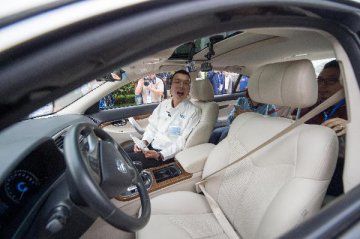Tech Launch Arizona (TLA), the commercialization arm of the University of Arizona, inked a partnership with two Chinese entities as a Silicon Valley delegation visited China Thursday.
TLA will work with industrial park developer China Fortune Land Development Co., Ltd (CFLD) and Chinese start-up incubator Techcode to help develop the tech sector in Hebei Province's Gu'an County, part of larger efforts to develop the Beijing-Tianjin-Hebei area into a high-tech metropolitan hub, according to the agreement.
The partnership came after a group of Silicon Valley delegates signed an MOU with CFLD and Techcode to promote entrepreneurship and innovation in Gu'an on Tuesday.
The Silicon Valley delegation will travel to about 10 Chinese cities, including Shanghai, Xi'an and Qingdao, over the next few weeks to seek regional cooperation in innovation. Marilyn Librers, deputy mayor of Morgan Hill, California, said it is the eighth time for her delegation to visit China to seek cooperation.
Librers, also president of China Silicon Valley, an organization to promote cooperation between China and the U.S. tech hub, added the two sides have much to learn from each other and they will work together in cutting-edge technology such as artificial intelligence (AI) and virtual reality.
AI is a key focus of cooperation. There are about 6,000 companies developing AI technology and applications worldwide. Most of them are located in the United States, Europe and China, where talent and investment are abundant thanks to an open innovation environment, according to Erica Huang, Techcode CEO.
AI will reshape many industries in the next 10 years, and cross-sector and cross-border cooperation in the field is important, Huang said, adding that Techcode just launched an AI accelerator in October that operates in six countries to help nurture the growing field.
Techcode also signed a strategic partnership agreement with global graphics processing tech giant NVIDIA on Thursday to seek cooperation on AI.
Alan Beebe, president with the American Chamber of Commerce in China, said innovation has no boundaries, and about 90 percent of the chamber's member companies think innovation will be the key driver of future business in China.
The other key field for investment and growth is digitalization, which will reshape operations, products, and services in the automobile, financial, IT and healthcare sectors, he added.




















Latest comments